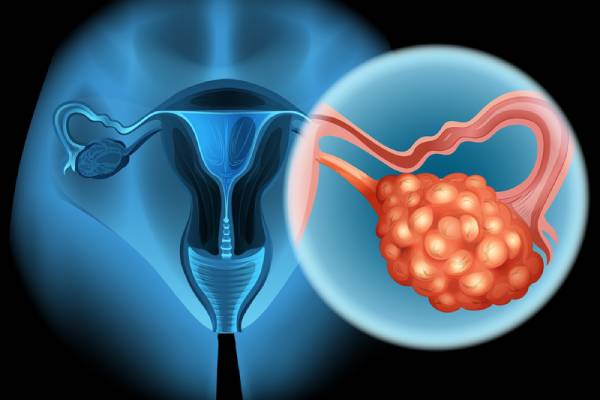Approximately 500,000 women worldwide are diagnosed with gynecological cancer each year, with over 100,000 new cases identified in India alone. So if you find any signs or symptoms of gynecologic cancer connect with Dr. M.S.S. Keerthi the best gynecologic oncologist in Hyderabad, treated more than 10000+ cancer patients and performed more than 3000+ cancer surgeries in her 15+ years of experience ,she holds position of best surgical oncologist in Hyderabad.

Dr. MSS Keerthi currently working as a Senior Consultant Surgical Oncologist and laparoscopic and robotic Surgeon at Tulasi Hospital, and Evoke Clinic at Securandarbad, Telangana. Here she can provides a comprehensive treatment and care approach to patients by promptly diagnosing cancer-related malignancies, enabling the creation of personalized and effective treatment plans for individuals.
What is Gynecological Cancer?
Gynecological cancers refer to a group of cancers that develop in the female reproductive organs, including the ovaries, cervix, uterus, vagina, and vulva. Early diagnosis and a comprehensive treatment approach are crucial for effectively managing these cancers.
Types of Gynecological cancer:
- Cervical Cancer: This cancer begins in the cervix, the lower portion of the uterus that connects to the vagina. maximum cases of cervical cancer are caused by the human papillomavirus( HPV).
- Ovarian Cancer: Ovarian cancer originates in the ovaries, which are responsible for producing eggs and female hormones. It’s constantly related to as a” silent killer” because it may not cause symptoms until it has spread considerably within the pelvis and stomach.
- Uterine (Endometrial) Cancer: This cancer starts in the filling of the uterus( endometrium). It’s the most common type of cancer of the female reproductive system.
- Vaginal Cancer: Vaginal cancer starts in the vagina, the muscular pipe that connects the uterus to the outside of the body. It’s a rare cancer.
- Vulvar Cancer: This cancer begins in the vulva, the external portion of the female genitalia. It can occur on the inner or external shells of the labia majora or minora, clitoris, or vaginal glands.
What are the symptoms of Gynecological cancer?
As per, best cancer specialist in Hyderabad Dr. MSS Keerthi gynecological cancers relate to cancers that affect the female reproductive system, including the cervix, ovaries, uterus, fallopian tubes, vagina, and vulva. Each type of gynecological cancer may present with different symptoms. It’s important to note that many of these symptoms can also be caused by non- cancerous conditions.
- Abnormal vaginal bleeding or discharge
- Pelvic pain or pressure
- Changes in bowel or bladder habits
- Pain during intercourse
- Bloating or feeling full quickly after eating
- Itching, burning, or irritation in the genital area
- Unexplained weight loss or fatigue
However, it’s important to consult with a healthcare professional for proper treatment and opinion, If you witness any of these symptoms.
Causes of Gynecologic cancer:
- Human papillomavirus (HPV) infection, particularly for cervical cancer.
- Hormonal imbalances, such as estrogen excess, contributing to uterine cancer.
- Genetic predisposition or family history.
- Environmental factors like smoking and exposure to certain chemicals.
- Age, with risk increasing as women get older.
- Chronic inflammation or infections.
- Immunosuppression, weakening the body’s ability to fight cancerous cells.
Diagnosis:
According to Dr. MSS Keerthi a best gynecologic oncologist in Hyderabad ,says that diagnosing gynecological cancer involves utilizing specific tools and tests tailored to the type and location of the cancer, alongside considering factors like the patient’s medical history and overall health status.
The following tests will help with the diagnosis of a gynecological cancer:
- Pap Smears: Pap smears are screening tests used to detect cervical cancer. During a pap smear, a healthcare provider collects cells from the cervix and examines them for any abnormalities.
- Pelvic Exams: Regular pelvic exams involve a thorough examination of the female reproductive organs, helping detect any visible abnormalities or tumors.
- Imaging: Various imaging techniques are used to assess the extent of the cancer. These may include ultrasounds, CT scans, MRIs, or PET scans.
- Biopsy: A biopsy is the definitive diagnostic tool for gynecological cancers. It involves the removal of a small tissue sample from the affected area for examination under a microscope.
- Staging: Staging determines the extent and spread of the cancer. It helps in planning appropriate treatment and assessing the prognosis.
Treatment Options:
- Surgery: Surgical procedures are often the primary treatment for gynecological cancers. They include:
- Hysterectomy: The removal of the uterus, cervix, and often the ovaries and fallopian tubes.
- Ovarian Debulking: Surgical removal of tumor masses in ovarian cancer.
- Lymph Node Dissection: Removal and examination of lymph nodes to determine the extent of cancer spread.
- Laparoscopic or Robotic Surgery: Minimally invasive techniques that use small incisions and specialized tools for less postoperative pain and shorter recovery times.
- Radiation Therapy: Radiation therapy uses high-energy X-rays or other particles to destroy cancer cells or stop their growth. Types of radiation therapy include:
- External Beam Radiation: Delivered from outside the body to target the tumor.
- Brachytherapy: Placement of radioactive sources directly into or near the tumor site.
- Chemotherapy: Chemotherapy involves the use of drugs to kill or slow down the growth of cancer cells. The choice of drugs, dosage, and treatment schedule varies based on the specific cancer type. Side effects can include nausea, fatigue, hair loss, and lowered blood cell counts.
- Hormone Therapy: Hormone therapy is used for certain gynecological cancers, such as uterine cancer. It aims to block or interfere with the hormones that promote cancer growth.
- Targeted Therapy: Targeted therapy drugs are designed to specifically target proteins or other molecules involved in cancer growth and spread. They are often used in combination with other treatments.
- Immunotherapy: Immunotherapy harnesses the body’s immune system to attack cancer cells. It is an evolving field of cancer treatment and may be used for some gynecological cancers
Supportive Care:
- Fertility Preservation: For women of childbearing age, fertility preservation options may be discussed before treatment to retain the possibility of having children in the future.
- Psychological Support: Gynecological cancer diagnosis and treatment can be emotionally challenging. Psychological support, including counseling or support groups, can help patients cope with the emotional aspects of cancer.
- Pain Management: Pain management is an integral part of cancer care. Healthcare providers work to alleviate any pain or discomfort associated with the disease or its treatment.
Why Choose Dr MSS Keerthi for Gynecologic Cancer treatment in Hyderabad:
- Expert Oncologist: Dr. MSS Keerthi is described as an expert surgical oncologist with more than 15 years of experience in performing various cancer surgeries. Having specialized in Surgical Oncology from the Cancer Institute, she’s likely to retain a deep understanding of Gynecological cancer and its treatment.
- State-of-the-Art Facility: The citation of a state- of- the- art facility suggests that the medical structure where Dr. MSS. Keerthi practices are equipped with improved technologies and ultra modern amenities. And other installations like wheelchair accessible, cleaned toilets and proper consulting rooms.
- Clinic Location: Dr. MSS Keerthi practices at Tulasi Hospital and Evoke Clinic in Secunderabad, Telangana.
- Diagnostic Services under one Roof: The availability of diagnostic services in the same facility can streamline the diagnostic process for patients. Having all necessary tests and services like , oral cancer , colon cancer and lung cancer treatment etc.in one location may lead to a more efficient and coordinated approach to diagnosis and treatment planning.
- Experienced & Trained Staff: Dr. MSS Keerthi is supported by experienced and trained staff, which implies a collaborative and well-coordinated approach to patient care.
- Personal Care, Every Time: Dr. MSS Keerthi is noted for her compassionate and tailored approach to patient care, which includes listening to patients’ concerns and working closely with them to establish personalized treatment programs.
Book An Appointment:-
Dr. MSS Keerthi provides the best treatment for various cancer diseases in Secunderabad and Hyderabad. For more information about our comprehensive treatment options, or to request an appointment with the best surgical oncologist in Secunderabad, Hyderabad call +91 94908 08080 or Click on Book Appointmentfor online booking
Book An Appointment
Frequently Asked Questions (FAQ's):
Dr MSS Keerthi is best cancer specialist and best gynecologic oncologist in Hyderabad who offers range treatment choices for all kinds of surgeries connected to gynecologic cancer.
The main causes of gynecological cancer can vary depending on the specific type, but factors such as genetic predisposition, HPV infection, hormonal imbalances, and lifestyle choices like smoking can contribute to their development.
Women are at risk for gynecological cancers, with factors such as age, family history, HPV infection, smoking, obesity, and certain genetic conditions increasing the risk.
The five main types of gynecological cancers are ovarian, cervical, uterine (endometrial), vaginal, and vulvar cancers.
